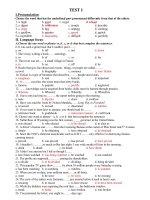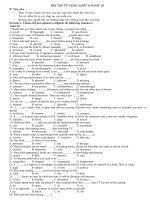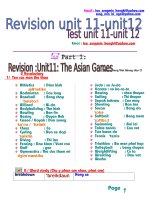Unit 11 12 Review 4 for English 6 (2020)
Bạn đang xem bản rút gọn của tài liệu. Xem và tải ngay bản đầy đủ của tài liệu tại đây (601.46 KB, 41 trang )
1
2
Contents
3
4
Unit 11: Our Greener
World
THIS UNIT INCLUDES:
VOCABULARY
Things that can be reduced, reused and recycled
Environmental problems and their effects
PRONUNCIATION
Sounds: /а:/ and /æ/
GRAMMAR
Conditional sentences - type 1
COMMUNICATION
Talking about ways to 'go green'
Lesson 1: Getting Started
A. Words
environment : môi trường
reusable: có thể dùng lại được
check-out: kiểm tra
deforestation: nạn phá rừng
air pollution: ô nhiễm không khí
water pollution: ô nhiễm nguồn nước
noise pollution: ô nhiễm tiếng ồn
5
soil pollution: ô nhiễm đất
B. All activities keys
Activities 1. Listen and read.
a/ Read the conversation again and complete the
following sentences. Use no more than three words in each
blank.
Keys
1. Nick is going on a picnic tomorrow.
2. The green shopping bag is reusable. The materials of the
bag are natural.
3. People can buy the bag at the check-out.
4. Mi wants to buy a/ a reusable bag for her mum.
5. Nick thinks that Mi’s 'green' because she’s cycling.
b/ Based on the ideas in the conversation, match the first
half of the sentence in column A with its second half in
column B.
Keys
1. b
2. c
3. a
c/ Find these expressions in the conversation. Check what
they mean.
Keys
6
1. I understand
2. used to introduce a new subject for consideration or to
give further information
3. used to say ‘no’ or ‘not’ strongly (can also be used to mean
'no problem'.)
d/ Fill each blank with a suitable expression.
Keys
1. I see
2. Not at all
3. By the way
Activities 2. There are a lot of environmental problems
today. Write each problem in the box under the picture.
Keys
1. soil pollution
2. deforestation
3. water pollution
4. noise pollution
5. air pollution
Activities 4. Match the causes in column A with the effects in
column B.
Keys
7
1. b
2. d
3. e
4. c
5. A
Lesson 2: A Closer Look 1
A.
B.
Words
rubbish: rác
clothes: quần áo
glass: kính
blub: bóng đèn
can: lon
plastic bags: túi nhựa
plastic bottle: chai nhựa
paper: giấy
reduce: giảm
reuse: sử dụng lại
recycle: tái chế
All activities keys
Vocabulary
Activities 1. The three Rs stand for Reduce – Reuse – Recycle.
Draw a line from a symbol in column A, to the matching word
in column B, and meaning in column C.
Keys
8
Activities 2. Write a word in the box under each picture.
Keys
1. rubbish
2. plastic bags
3. glass
4. plastic bottle
5. can
6. noise
7. paper
8. bulb
9. water
10. clothes
Activities 3. Put the words from Activities 2 into groups. One
word can belong to more than one group.
Keys
9
- Reduce: electricity, gas
- Reuse: envelope, carton box, old textbook
- Recycle: newspaper, textbook, plastic container
Activities 4. Listen to the 'Three Rs' song, and then sing along.
(Nghe track 36 – CD 2)
Pronunciation
Activities 5. Listen and repeat. Pay attention to how the
underlined part is pronounced.
(Nghe track 37 – CD 2)
Activities 6. Listen again and put the words in the correct
column.
Keys
10
/a:/
fast, plastic, glass,
dance, answer,
afternoon
Nhiều từ khác:
/æ/
had, bag, apple, activity
/a:/: last, staff, half
/æ/: fan, hand, understand, tap, can
Activities 7. Read the conversation. Write /a:/ or /æ/ below
each underlined letter.
Keys
/a:/: class, ask, father
/æ/: stand, have, that
Activities 8. Listen to the conversation and check your
answers. Practise the conversation with a classmate.
Audio script
Vy: What do these three Rs stand for, Mi?
Mi: They stand for reduce, reuse and recycle.
Vy: Our class is organising a writing contest. We have to write
about the environment.
Mi: I see. Why don’t you write about the three Rs?
Vy: That’s a good idea. I will ask my father for ideas.
Mi: Yes. He works at the Green Company, so he’ll give you a
lot of information.
11
Lesson 3: A Closer Look 2
A. Basic knowledge
B. All activities keys
Grammar
Activities 1. Listen again to part of the conversation from
Getting Started. Pay attention to the conditional sentences type 1.
Audio script
12
Nick: Yes, I do. It’s better than a plastic one because it's made
of natural materials. If we all use this kind of bag, we’ll help
the environment.
Mi: I see. I’ll buy a bag for my mum. Where can I buy it?
Nick: They sell a lot of these bags at the check-out.
Mi: Thanks. Are they expensive?
Nick: Not at all. By the way, you’re also 'green'. You’re cycling.
Mi: You’re right. If more people cycle, there will be less air
pollution. Right?
Activities 2. Write the correct form of each verb in brackets.
Keys
1. is; will plant
2. recycle; will help
3. will save; don’t waste
4. will have; use
5. isn’t/is not; will be
Activities 3. Match an if-clause in column A with a suitable
main clause in column B.
Keys
1. c
2. e
3. b
4. a
5. d
Activities 4. Combine each pair of sentences below to make
a conditional sentence - type 1.
13
Keys
1. If we pollute the air, we will have breathing problems.
2. If people pollute the water, a lot of fish will die.
3. If we cut down trees in the forest, there will be more
floods.
4. If the soil is polluted, plants will die.
5. If there is noise pollution, people and animals will have
hearing problems.
Activities 5. Use your own ideas to complete the sentences
below. Share your sentences with a classmate. Do you have
the same sentences?
Keys
1. If you walk to school, you will help reduce air pollution.
2. If you use recycled paper, you will save trees.
3. If the Earth becomes hotter, the sea level will rise.
4. If parents teach their children about the three Rs, children
will help the environment.
5. If you want to save a lot of electricity, you will have to turn
off all the lights before going out.
Lesson 4: Communication
A. Words
14
do a survey: thực hiện một cuộc khảo sát
be in need: có nhu cầu
recycling bin: thùng tái chế
breeze: khoe
wrap: bọc, gói
invite: mời, gọi
Lesson 5: Skills 1
A. Words
charity: từ thiện
swap: trao đổi (=trade)
envelopes: phong bì
tips: lời khuyên
vegetable: rau
throwing: ném
B. All activities keys
Reading
Activities 1. Find these words or phrases in the text and
underline them.
Keys
15
Activities 2. Match the words with their meanings.
Keys
Activities 3. Answer the questions.
1. What will you try to put in every classroom?
2. What can you do with your old clothes?
3. What kind of pens and pencils should you use?
4. How can you save water?
16
5. If you bring water bottles to a picnic, what type of
bottles should you bring?
Keys
1. Recycling bins.
2. Give them to charity or swap them with your friends or
cousins.
3. Refillable ones.
4. Turn the tap off when brushing your teeth or washing
the dishes.
5. Reusable water bottles.
Speaking
(Tự làm)
Lesson 6: Skills 2
A. All activities keys
Listening
Activities 1. The 3Rs Club is looking for a new president.
Listen to two students talking about what they will do if
17
they become the president of the club. Put the words or a
number in each blank to complete the table.
Keys
1. 6A
2. recycling
3. saving lights
4. book
5. 6E
6. bus
7. gardening
8. uniform
Audio script
- I’m Mi from class 6A. If I become the president of the 3Rs
Club, firstly, I’ll talk to my friends about putting a recycling
bin in every classroom. Then we can reuse or sell the
things we have in these bins. Secondly, if we get a lot of
money from selling these things, we’ll buy energy-saving
lights for every class. Finally, I’ll organize a few book fairs.
There, students can swap their used books.
- I’m Nam from class 6E. If I become the president of the
Club, I’ll encourage the students to go to school by bus. It’ll
be fun and save the environment. Next, I will set up a
18
gardening group. We can grow flowers in our school
garden. Finally, I’ll organize some uniform fairs. There,
students can swap their used uniforms with younger or
older students.
Activities 2. Tick () True (T) or False (F).
1. F
2. F 3. T 4. F 5. T
Writing
(Tự làm)
Lesson 7: Looking Back
A. All activities keys
Vocabulary
Activities 1. Add more words to the word webs below.
Keys
19
Activities 2. In pairs, ask and answer questions about the
3Rs.
(Tự làm)
Activities 3.
a/ Complete the words or phrases.
1. deforestation
2. air pollution
3. water pollution
4. noise pollution
5. soil pollution
b/ Match each word or phrase from a/ with an
effect below to make a sentence.
1. b
2. e
3. a
4. c
5. d
Grammar
20
Activities 4. Write the correct form of each verb in brackets.
1. is; will rise
2. rises; will disappear
3. reduce; will have
4. don’t have; will be
5. are; will be
Activities 5. Combine each pair of sentences below to
make a conditional sentence - type 1.
1. If students recycle and use recycled materials, they will
save energy.
2. If we use the car all the time, we will make the air dirty.
3. You will save electricity if you turn off your computer when
you don't use it.
4. People will stop using so much energy if they want to save
the environment.
5. If you see a used can on the road, we …
Communication
(Tự làm)
21
Unit 12: Robots
THIS UNIT INCLUDES:
VOCABULARY
Words to name everyday activities
PRONUNCIATION
Sounds: /ɔɪ/ and /aʊ/
GRAMMAR
Could for past ability
Will be able to for future ability
COMMUNICATION
Asking and answering questions about abilities or skills
Expressing agreement and disagreement
Lesson 1: Getting Started
A. Words
sick: bệnh
simple things: những điều đơn giản
minor role: vài trò nhỏ
human: con người
driving: điều khiển
able: có thể
B. All activities keys
Activities 1. Listen and read.
22
a/ Read the conversation again. Answer the following
questions.
1. What could robots do in the past?
2. Can robots teach?
3. What will robots be able to do in the future?
4. Will robots be able to play football or drive a car?
Keys
1. They could only do very simple things.
2. Yes, they can.
3. They will be able to do many things like humans.
4. No, they won’t.
b/ Find the four types of robots in the conversation.
Write them under the correct pictures below.
Keys
1. teaching robots
2. worker robots
3. doctor robots
4. home robots
Activities 2. Match the activities with the pictures. Then
listen, check and repeat the phrases.
23
Keys
1. c
2. d
3. a
4. b
Lesson 2: A Closer Look 1
A. Words
guard: canh giữ, canh gác
lift: nâng lên, nhấc lên, giơ lên
recognise: nhận ra
voice: tiếng nói
shout: kêu la
boil: sôi lên
B. Basic knowledge
24
C. All activities keys
Vocabulary
Activities 1. Match the verbs in column A to the
words/phrases in column B. Then listen, check and repeat
the words/phrases.
Keys
1. c
2. a
3. b
4. e
5. d
Grammar
Activities 3. Put the words in the correct order.
1. could/do sums/Mary/at the age of 7/.
2. read and write/you/Could/when you were 6/?
3. could/Robots/lift heavy things/some years ago/.
4. move easily/couldn’t/Robots/until recent years/.
Keys
1. Mary could do sums at the age of 7.
2. Could you read and write when you were 6?
3. Robots could lift heavy things some years ago.
4. Robots couldn’t move easily until recent years
Pronunciation
25









